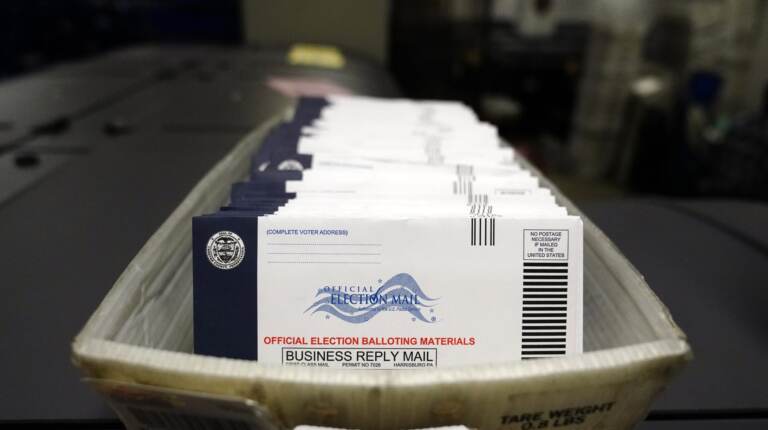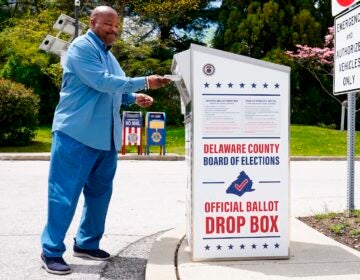‘Subterfuge and manipulation’ or adapting to society? Delaware Democrats try again to pass no-excuse absentee voting
An effort to change the constitution failed in 2021. Last year, courts struck down a new law allowing mail-in balloting for anybody who wanted it.
Listen 1:43
File photo: A new law in Delaware would make absentee mail-in voting legal for any voters in Delaware. Here, mail ballots for the 2020 General Election in the United States are seen before being sorted at the Chester County Voter Services office, Friday, Oct. 23, 2020, in West Chester, Pa. (Matt Slocum/AP Photo)
Making absentee mail-in voting legal in Delaware for anyone who chooses that option has been a mission for many Democratic lawmakers over the last four years.
Most states, including Delaware neighbors Pennsylvania, New Jersey, and Maryland, already allow no-excuse absentee balloting. The quest to do so in Delaware has stumbled, however, because the Delaware Constitution only allows absentee voting for limited reasons such as work or illness.
One effort to change the constitution faltered in 2021, and an attempt last year to skirt the constitution was struck down in court. But now a new bid to amend the constitution is under way.
Changing the constitution is no simple feat, however. It requires a two-thirds majority by two consecutive two-year sessions of the General Assembly. That means an amendment approved this year wouldn’t be able to become law until after the 2024 election.
Democrats who dominate the state House and Senate say it’s a practical step that’s widely accepted across most of America. House Minority Leader Mike Ramone, however, sees the move as a sinister step that paves the way to “to install a de facto vote-by-mail scheme.”
Democrats sneer at that suggestion, saying no such plan is even being considered. But for the current effort to succeed, they will need a smattering of GOP support, at least in the House.
GOP backing wasn’t a problem in 2019, when the House approved the first leg of the constitutional amendment by a 38-3 vote, with several Republicans voting yes.
That support evaporated in 2021, however, when Democrats tried to pass the second leg. Ramone’s current concern is one some Republicans expressed then when rejecting the measure. “I believe they intend to turn no-excuse absentee voting into a ‘vote-by-mail’ system — a scheme that will benefit Democrats,’’ then-Minority Leader Danny Short said at the time. “We may not have seen the last of this bill, but House Democrats have given us even less reason to trust their good intentions on this issue.”
So in 2022, Democratic lawmakers took a different approach. They simply passed a law allowing no-excuse absentee balloting.
The state Republican Party responded by suing in Chancery Court, arguing that it violated the state constitution, which only allows absentee balloting when a voter can’t get to their polling location for these reasons:
- Public service to the state or nation.
- Business or occupation for themselves, or when accompanying a spouse or dependent to work.
- Illness or injury.
- Tenets or teachings of religion.
While the court considered the lawsuit, about one-fifth of all voters in the September primary elections voted by mail.
Yet before the November general election, both the Chancery and Supreme courts struck down the new statute.
“The vote-by-mail statute impermissibly expands the categories of absentee voters identified’’ in the constitution, the justices ruled in a unanimous vote.
‘Anything we do to make it easier is a good thing’
So now Democrats have mounted a second attempt to change the constitution.
The measure under consideration strikes the section that addresses “General laws for absentee voting” by removing the limited reasons someone is allowed to use absentee voting.
The bill also authorizes the Legislature to “enact general laws providing the circumstances, rules, and procedures by which a qualified voter may vote by absentee ballot.” Those laws must require the absentee voter to declare that their ballot “is free from improper influence.”
The Senate took the first successful step last week, approving the measure 15-5 in a party-line vote with one of the chamber’s six Republicans not voting.
Sen. Trey Paradee, a co-sponsor, says absentee balloting just makes sense in modern society.
“The reality is people lead very busy lives these days,’’ Paradee said. “It just makes it difficult for a lot of people to get off on a Tuesday and make it to the polls. So I think anything that we can do to make it easier is a good thing. And I think we’ve proven time and time again that these expansions of voting opportunities can be done safely without any serious issues of fraud or malfeasance.”
Now the first leg of the constitutional amendment has moved to the House, where it needs 28 votes in a chamber where Democrats have a 26-15 advantage.
State Rep. Rae Moore, the chief House sponsor, calls the amendment a necessary change and says she’s working across the aisle to garner GOP support.
“I need two Republican votes,’’ Moore said. “So I’m optimistic that they will understand the importance of this and how it will impact their constituency.”

Democrats’ approach “reveals the true motives”
Getting those Republican votes could be challenging.
Ramone says the “momentous change” sought in the proposed amendment “would significantly lower the bar for Democrats to manipulate the law, with no Republican input needed. This bill is a clear attempt at subterfuge and manipulation.”
Ramone says the fact that the proposal also allows the Legislature to follow up a constitutional change by creating new laws to govern absentee voting is a “far more convoluted approach” that “reveals the true motives behind this initiative.”
State Rep. Paul Baumbach, a co-sponsor, scoffs at the notion that the amendment is a pretext to get rid of in-person voting or even to send every voter a mail-in ballot.
“I’ve never heard a whisper of that,’’ he said.
So what does the Newark Democrat think of the arguments the GOP is making?
“Sounds like they’re inventing it,’’ he said. “This is explicitly for absentee ballots.”
Should the constitution be changed in 2025, Baumbach expects that lawmakers would simply codify that no excuse is needed to cast an absentee ballot.
“The current rules are extremely restrictive and they’re just plain inconsistent with society,” he said, “and with the wishes of Delawareans.”
Yet Republican Jane Brady, former Delaware attorney general and Superior Court judge, remains skeptical. Brady headed the state GOP last year when it successfully challenged the new law in court.
“Although they’re calling it the ‘no-excuse absentee amendment,’ it could easily be called the ‘mail a ballot to every registered voter without asking them bill,’ because it gives the [Democratic] majority and the Legislature the authority to change the laws as they please,’’ Brady said.

“The language is overly broad and does not restrict the authority of the General Assembly under that amendment to only allowing for no-excuse absentee voting.”
But first things first. And that’s for lawmakers to decide whether the constitutional amendment will clear the first hurdle this year, and if so, again in 2025.
Even if it passes this year, Paradee remembers what happened in 2021.
“If it turns out that there’s a large turnover in legislators, you kind of have to go through the process of re-educating the new people about the bill and how important it is,’’ Paradee said.
“So certainly there’s no guarantee. But there’s a reason why the architects of our democracy and the architects in our state created this process. They wanted it to be thoughtful and deliberative, that if we were making a change to our Constitution that’s going to affect future generations, they wanted to make sure that it was a very, very well-thought out process.”

Get daily updates from WHYY News!
WHYY is your source for fact-based, in-depth journalism and information. As a nonprofit organization, we rely on financial support from readers like you. Please give today.







